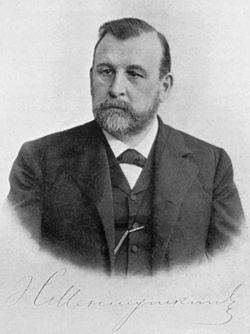Nikolai Menshutkin
Nikolai Aleksandrovich Menshutkin was a Russian chemist who discovered the process of converting a tertiary amine to a quaternary ammonium salt via the reaction with an alkyl halide, now known as the Menshutkin reaction.
Menshutkin was born in a merchant family as the sixth son of Alexander Nikolaevitch Menshutkin. He graduated with honors from gymnasium in December 1857, but only by autumn 1858 managed to enroll to the Saint Petersburg State University, as he was still under the prescribed age of 16. He studied at the faculty of physics and mathematics and was nearly expelled in the autumn of 1861 due to some political disturbances. Nevertheless, by the spring of 1862 he attained the masters degree. During the last years he became interested in chemistry, which he studied under Dmitri Mendeleev. While he acquired a sufficient knowledge of theory he was lacking practice, as at that time the entire laboratory of the university consisted of only two small rooms. Therefore, he went abroad, and in the following three years spent two semesters with Adolph Strecker at the University of Tbingen, a year with CharlesAdolphe Wurtz at the University of Paris, and a semester with Adolph Wilhelm Hermann Kolbe at t
Source: Wikipedia

